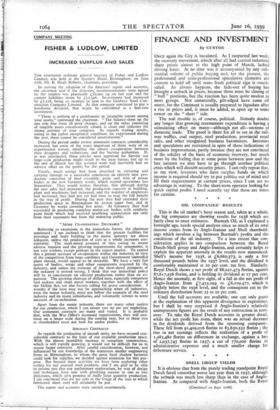OIL COMPANIES' RESULTS
This is the oil market's busy season and, taken as a whole, • the big companies are showing results for 1938 which are fairly close to most estimates. Burmah Oil, as I explained a fortnight ago, needs special analysis since so much of its total income comes from its Anglo-Iranian and Shell sharehold- ings which involves a lag between Burmah's profits and the conditions of the oil industry. To a less extent that con- sideration applies in any comparison between the Royal Dutch-Shell group and Anglo-Iranian, and certainly helps to explain the apparent anomaly in the results now announced. Shell's income for 1938, at £6,680,373, is only a few thousand pounds below the 1937 level, and the dividend is comfortably maintained at 20 per cent. tax free. Similarly, Royal Dutch shows a net profit of 88,021,473 florins, against 87,617,256 florins, and is holding its dividend at 17 per cent. Hence the anomaly, at first sight, of a fall in the net profit of Anglo-Iranian from £7,455,094 to £6,109,477, which is slightly below the 1936 level, and the consequent cut in the ordinary distribution from 25 to 20 per cent.
Until the full accounts are available, one can only guess at the explanation of this apparent divergence in experience, but I shall be very surprised if Anglo-Iranian's relatively unimpressive figures are the result of any contraction in turn- over. To take the Royal Dutch accounts in greater detail, while the net profit has risen, there was an actual decrease in the dividends derived from the operating companies. These fell from 91,409,016 florins to 85,630,332 florins • the rise in net earnings reflects the realisation of a profit of 1,583,480 florins on differences in exchange, against a loss of 2,937,745 florins in 1937, a cut of 770,000 florins in administrative expenses and a much smaller charge for debenture service.
* * * *






















































 Previous page
Previous page